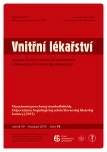-
Medical journals
- Career
SAVOR ‑ TIMI 53 – Saxagliptin and cardiovascular outcomes in patients with type 2 diabetes mellitus
Authors: J. Špinar 1; A. Šmahelová 2,3
Authors‘ workplace: Interní kardiologická klinika Lékařské fakulty MU a FN Brno, pracoviště Bohunice, a ICRC Brno, přednosta prof. MU Dr. Jindřich Špinar, CSc., FESC 1; III. interní gerontologická a metabolická klinika Lékařské fakulty UK a FN Hradec Králové, přednosta prof. MU Dr. Luboš Sobotka, CSc. 2; Subkatedra diabetologie Lékařské fakulty UK Hradec Králové, vedoucí doc. MU Dr. Alena Šmahelová, Ph. D. 3
Published in: Vnitř Lék 2013; 59(11): 1003-1007
Category: Review
Overview
Background:
The type 2 Diabetes Mellitus treatment is currently effective but still not ideal. A therapy based on the incretins, which represents a significant qualitative progress, is close to an ideal. The first completed mortality study with dipeptidyl peptidase (DPP ‑ 4) inhibitors is the study called SAVOR as presented in Amsterdam during the European Cardiology Congress in 2013.Methodology:
SAVOR (Saxagliptin and Cardiovascular Outcomes in Patients with Type 2 Diabetes Mellitus) randomised 16,492 patients with Type 2 Diabetes Mellitus and a high-risk of cardiovascular events treated with current per oral antidiabetics and patients treated with saxagliptin or placebo. Eight thousand eight hundred and twenty patients were randomised to be treated with saxagliptin and 8,212 were randomised to be treated with placebo. The average monitored period was 2.1 years.Results:
The primary goal (cardiovascular death, non‑fatal myocardial infarction and non‑fatal CMP) occurred in 7.3% (613) patients treated with saxagliptin and in 7.2% (609) patients treated with placebo (HR 1.00, p < 0.001 for non‑inferiority). The main secondary goal (cardiovascular death, myocardial infarction, vascular stroke, hospitalisation for a heart failure or angina pectoris and myocardial revascularisation) occurred in 12.8% (1,059) patients treated with saxagliptin and in 12.4% (1,034) patients treated with placebo. The number of hospitalisations for heart failure was 289 (3.5%) in the group treated with saxagliptin and 228 (2.8%) in the group treated with placebo (p = 0.007).Conclusion:
DPP ‑ 4 inhibitor saxagliptin did not increase the occurrence of ischemic cardiovascular events but it inclined to an increased hospitalisation for heart failure in patients with the already present heart failure. It did not increase the occurrence of pancreatitis. Simultaneously it significantly improved the Diabetes Mellitus control, which could signal a future improvement in cardiovascular goals.Key words:
diabetes mellitus – DPP ‑ 4 inhibitors – saxagliptin – mortality – heart failure
Sources
1. Scirica BM, Bhatt DL, Braunwald E et al. The design and rationale of the Saxagliptin Assessment of Vascular Outcomes Recorded in patients with diabetes mellitus – Thrombolysis in Myocardial Infarction (SAVOR ‑ TIMI) 53 Study. Am Heart J 2011; 162 : 818 – 825.
2. Mosenzon O, Raz I, Scirica BM et al. Baseline characteristics of patients population in the Saxagliptin Assessment of Vascular Outcomes Records in patients with diabetes mellitus (SAVOR ‑ TIMI) 53 Trial. Diabetes Metab Res Rev 2013; 29 : 417 – 426.
3. Scirica BM, Bhatt DL, Braunwald E. SAVOR ‑ TIMI 53 Steering Committee and Investigators. Saxagliptin and Cardiovascular Outcomes in Patients with Type 2 Diabetes Mellitus. N Engl J Med 2013; 1317 – 1326.
Labels
Diabetology Endocrinology Internal medicine
Article was published inInternal Medicine

2013 Issue 11-
All articles in this issue
- Prevalence of diabetic retinopathy and distal symmetrical diabetic polyneuropathy, and glomerular filtration screening upon the diagnosis of type 2 diabetes mellitus – a cohort study
- Serious sepsis treatment in intensive care departments in the Czech Republic – EPOSS Project pilot results
- The new blood test biomarker SEPT9 and colorectal carcinoma screening
- Possibilities of genetic diagnostics of intestine tumour and inflammatory diseases in Slovakia
- SAVOR‑ TIMI 53 – Saxagliptin and cardiovascular outcomes in patients with type 2 diabetes mellitus
- Management of superficialis thrombophlebitis. Guidelines of the Angiologiy Section of the Slovak Medical Chamber (2013)
- The value of ECG assessment in pulmonary embolism diagnostics
- Atypical fracture of metatarsal bone in a patient with multiple myeloma who was treated long-term with bisphosphonates
- Inflammatory response and C‑ reactive protein value in patient with acute coronary syndrome
- Thyrostatic treatment and its adverse effects
- Role of cardiac biomarkers in monitoring of cardiotoxicity after hematopoietic stem cell transplantation
- Internal Medicine
- Journal archive
- Current issue
- Online only
- About the journal
Most read in this issue- Thyrostatic treatment and its adverse effects
- Inflammatory response and C‑ reactive protein value in patient with acute coronary syndrome
- The value of ECG assessment in pulmonary embolism diagnostics
- Management of superficialis thrombophlebitis. Guidelines of the Angiologiy Section of the Slovak Medical Chamber (2013)
Login#ADS_BOTTOM_SCRIPTS#Forgotten passwordEnter the email address that you registered with. We will send you instructions on how to set a new password.
- Career

